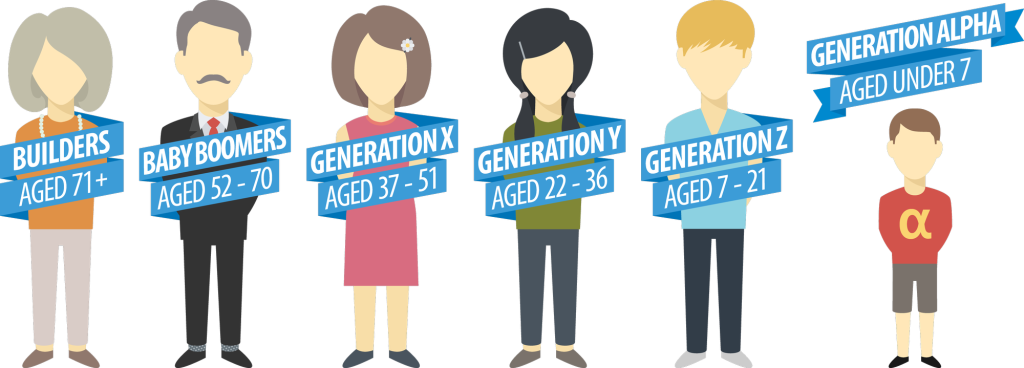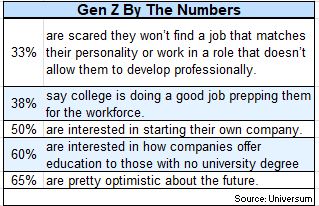Recently at the SHRM conference, I had the pleasure of meeting Heather Bussing’s son, Holden. As we all laughed and joked with this young man, we mentioned he was Gen Z, to which he replied:
Has anyone even defined Gen Z?
Actually, yes, they have. And they are entering the workforce right now. Like the millennials before them, many are confused about when the actual cutoff between the generations are, but generally, they’re born between 1996 and 2010 and the eldest are in the process of graduating.
I know, I know, you’re sick and tired of talking about generational differences but the thing is, for marketers and recruiters, knowing the market is KEY, and you can’t do that without acknowledging some serious truths about generational trends, tendencies and yup, stereotypes.
So, what about these new kids on the block?
Early research suggests that Generation Z is more pragmatic, more money-conscious, and more entrepreneurial than their millennial counterparts. This bears out in the most recent World’s Most Attractive Employers (WMAE) survey. Each year, Universum Global surveys nearly 300,000 students in 90% of the world’s economy to get a sense of where they want to work and what is important to them.
One notable trend this year is the movement toward smaller and smaller companies and the desire for stability aligned with innovation.  For Gen Z, work seems to be much more culturally important as more than 33% are scared they won’t find a job that matches their personality or work in a role that doesn’t allow them to develop professionally. And more than 50% want to start their own company.
For Gen Z, work seems to be much more culturally important as more than 33% are scared they won’t find a job that matches their personality or work in a role that doesn’t allow them to develop professionally. And more than 50% want to start their own company.
So how do you build branding that attracts those who may not stick around?
The answer is train them!
I know this scares people who don’t want to invest in training that will not benefit the company for a lifetime. But a Gallup poll found only 13% of the public has confidence college is doing a good job preparing them for the workforce. Which means they might be expecting employers to do it for them.
Employers can benefit from offering continuing learning opportunities to its employees as an attraction tool. We know these young people want to start their own businesses, but we also know they are attracted to stability, so chances are they won’t be starting them immediately post-graduation. Benefits like tuition repayment, in-depth training, startup schools and intrapreneur workshops can all attract Gen Z to your organization.
Structuring these benefits over time can also help you earn the loyalty of this pragmatic and money-conscious generation. Gen Zers will have many different jobs in their life, and they’ll need to continue to learn new skills and how to use new tools as they progress in their careers.
Ditch the degree requirement
Over 60% of Gen Z welcome information about how companies offer education to those with no university degree. This means if you follow the lead of companies like Ernst and Young, Google and others and decide a degree requirement is less important than it once was, you can open yourself up to hungry, talented workers with a bigger sense of loyalty to your company than any MBA student.
Look, nearly 62% don’t feel prepared for the job market even after college, so a degree doesn’t have quite the same cache as it used to. Add the skyrocketing costs of a degree these days and it might make sense for your organization to start seeking out grads from code schools, technical colleges, or even straight out of high school into a training program at your company.
Be flexible
I know you just spent a million dollars renovating your fancy open office to make it attractive to the collaborative and social millennials (in fact, 88% of them claim to prefer a collaborative work environment), but Gen Z doesn’t want any part of that. In fact, they value their independence faaaaar more.
On the other hand, simply because one Gen Zer eschews collaboration doesn’t mean they all do. In fact, collaboration may be even more natural to a group of people used to showing their teachers and parents how to use technology and working on group projects. They also are far more into face-to-face communication, even if it’s via Facetime, Google Hangouts or Facebook video chat. Independent, focused, pragmatic AND face-to-face inclined? Sounds like we need to get our work-flex lives in order to make this generation as productive as possible.
Gen Z Guru David Stillman and his 17-year-old son Jonah, on the other OTHER hand have this to say about collaboration and Gen Z, 35% of Generation Z “would rather share socks than an office space.”
Ewww!
Stop being rigid
This one is particularly difficult for me! Eleven years ago, when I joined Twitter and Facebook, I thought I was cutting edge. I tried every new network and social outlet. Today, I still cannot figure out how to download my own Snaps.
However, if I want to recruit smart and capable Gen Z employees (or talk to my children) I need to learn. In fact companies like Goldman Sachs and Taco Bell (talk about a high low spectrum) are using SnapChat to get in front of their target audiences and connect. But just a year ago, Instagram was the thing and recruiting leaders were scoffing at the idea that SnapChat could be anything useful in the recruitment space, just like leaders were laughing 10 years ago that Twitter could be used to hire. Now we have Facebook for Work and we’re not reaching Gen Z, but their moms.
But we gotta learn. Why? 83% of Gen Z are open to being contacted by companies via social channels. However, just half want to see an ad from an employer, according to employer branding research company Universum.
Grasp what mobile native means
When I want to look something up, I head to the desktop on the main floor of our house, or grab my laptop or even my iPadPro with the attached keyboard. When my eldest son works on calculus, he downloads his homework to his phone, uses the  calculator there, and accesses Khan Academy courses his teacher recommends via email. ALL on his phone. My youngest child happily taps out fiction stories, sans keyboard on his iPad mini. In fact, 52% of Gen Z are leveraging social media as a research tool in school.
calculator there, and accesses Khan Academy courses his teacher recommends via email. ALL on his phone. My youngest child happily taps out fiction stories, sans keyboard on his iPad mini. In fact, 52% of Gen Z are leveraging social media as a research tool in school.
Whether you think employer branding is a joke or not, it doesn’t really matter, Gen Z knows where to find out everything they need to know in order to decide whether to take a job with you. From marketing materials you WANT them to see to anonymous reviews and candidate experience stories you might NOT want them to see.
While all this seems like training to put off for another day, the time to start testing these strategies is now. Gen Z may already be in the building so to speak, especially when you’re looking to hire in highly competitive fields and for entry-level positions and/or interns. Take the time to learn about this incoming generation and what separates them from their older counterparts, then start crafting your employer brand for the workforce of tomorrow!
